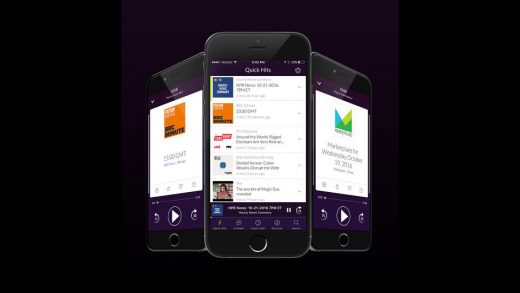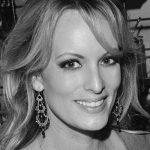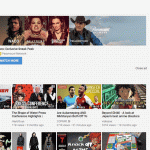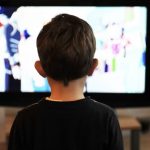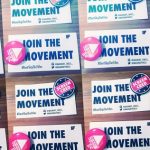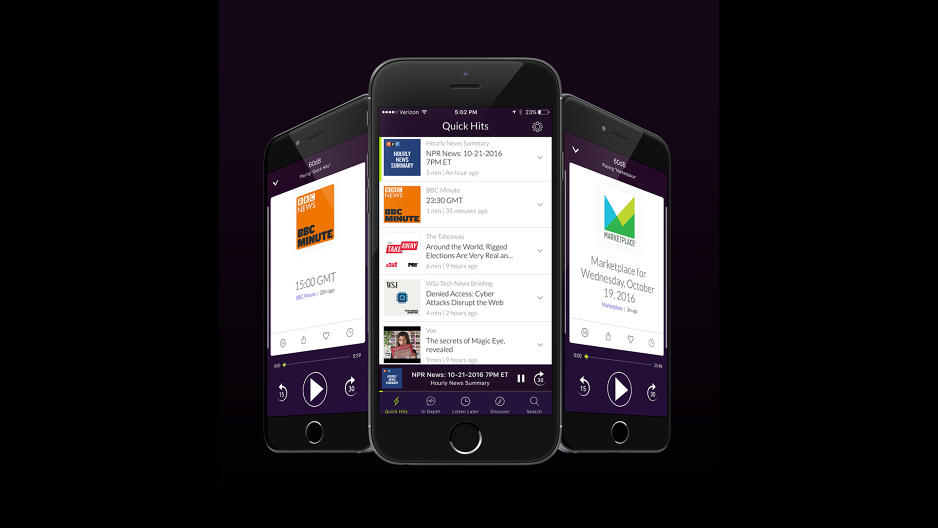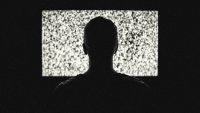How These Netflix And NPR Vets Plan To Reinvent Podcasts
One of the reasons Steve Henn moved to Silicon Valley six years ago was to preempt his own irrelevance. As a longtime public radio reporter, he knew the move promised access to the technology industry he covered for shows like Marketplace and Planet Money. But he also had a sinking feeling that, eventually, his industry would face disruption at the hands of digital forces akin to the ones that obliterated audiences and revenue for many newspapers and magazines.
“I came out here with the hope of being in a position to better understand the industry that’s likely to really transform the one I worked in,” says Henn of working in the Bay Area. “And ideally be in the position to help influence a transition that was really good for high-quality journalism.”
Then, about a year and a half ago, he met John Ciancutti. A 12-year veteran of Netflix, Ciancutti was not only familiar with the digital disruption of legacy media, but had seen how such upheaval could change an industry for the better. Naturally, the pair started talking about how technology might be used to reinvent radio as well. Even as podcasting was entering its current renaissance, there remained lots of opportunities for innovation in audio that had somehow not been tapped. So together with fellow Netflix alum Steve McLendon, Ciancutti and Henn did what people do in Silicon Valley. They started a company.
The startup, called Tiny Garage Labs, aims to reinvent radio for the digital age. Today, the fruits of their labor are available on iOS. The app is called 60dB (pronounced “sixty dee bee”) and at first glance, it may look like just another podcast listening app. And while you can certainly find most well-known podcasts on 60dB, there’s much more going on here. The app focuses on short-form audio, algorithmic personalization, and “lean back” ease of use, using this formula to carve out a middle ground between radio and podcasts that, its founders hope, will change the way we listen. But first, it needs users.
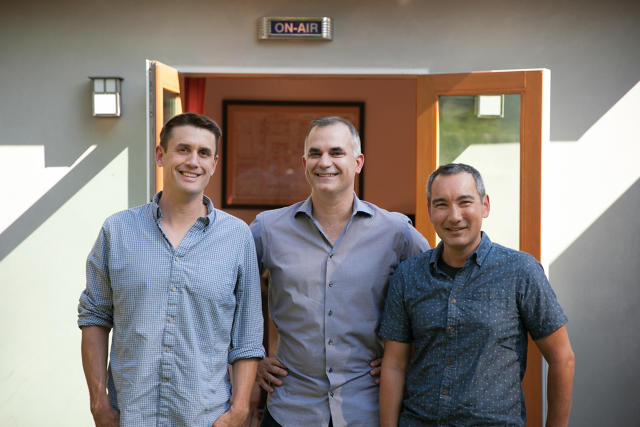
If the internet is indeed going to upend terrestrial radio, the disruption is taking its sweet time. More than a decade into its existence, podcasting is only now drawing in mainstream audiences—not to mention serious ad revenue and VC funding. But it has a ways to go. In 2015, 91% of Americans still tuned into terrestrial radio, according to Pew Research Center. And while podcast listenership is rising, only 21% of Americans reported listening to podcasts regularly last year.
“In America this week, more of us will listen to radio than will log onto Facebook,” says Ciancutti. Indeed, nearly 100 years after the first radio news broadcast, the medium remains surprisingly dominant in people’s lives as newspapers shrink and cable cords get cut. But why?
The reason, according to Henn and Ciancutti, is multipronged: As popular as podcasts are becoming, a 30-minute or 60-minute episode doesn’t always fit neatly into our lives. And unlike the radio, putting on a podcast requires work.
“One of the things I love about radio is it’s one button,” says Henn. “You turn it on and it’s on.”
60dB takes a crack at this shortcoming in digital audio, first, with design: The app starts playing as soon as you open it and they’re already planning an integration with Amazon Echo to enable hands-free voice control on Alexa-enabled devices.
But perhaps more importantly, they want to relieve listeners of the need to manually seek out shows by making the experience a personalized one. Leaning on years of experience building recommendation algorithms at Netflix, the team trained 60dB to learn about listeners, taking cues from their social graph (you can sign up with Twitter or Facebook) and making note of behaviors like skipping, subscribing, liking episodes, and even searching for specific topics and shows. Like Pandora or Netflix, the more you use 60dB, the smarter it gets and, in theory, the less you need to think about what you want to listen to next.
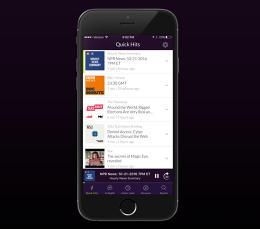
Audio discovery and personalization are nice concepts, but their effectiveness depends heavily on one thing: Content. Ideally, lots of it. That’s why 60dB is taking the unique path of focusing on short-form audio (called “Quick Hits” in the app), sometimes slicing up longer shows from providers like EPSN and breaking them into more specific, topic-based chunks that an algorithm can more easily pair with a given listener.
And while some podcasts are already short by design—news roundups from NPR and BBC, for example—most of them don’t fall within the three-to-10-minute sweet spot that 60dB is aiming for. This is where another major pillar of their strategy—as well as Henn’s expertise and Rolodex of fellow journalists—comes into play. To ensure an endless flow of relevant, timely audio shows into the ears of listeners, 60dB is teaming up with media outlets to create new short-form programs. Some outlets are already producing audio that would work well in this format. But to Henn, a high number of outlets are so painfully close to being able to do it, yet lack the resources, expertise, or time to produce a podcast in-house.
“The conversation about podcasts has made lots of publications interested in audio for the first time,” says Henn. “I think we can help them with that in a way that’s really powerful and that can reach a much bigger audience than a longform podcast ever could.”
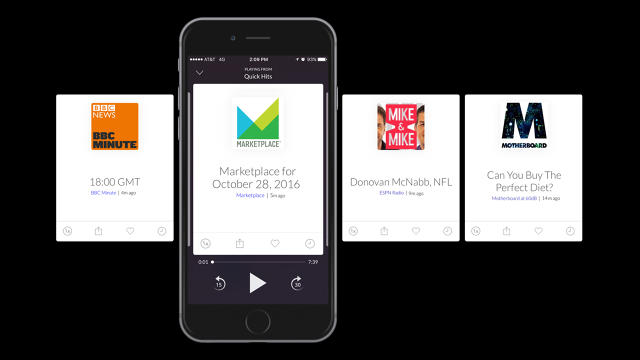
In many cases, 60dB’s team will help empower newsrooms and media organizations to produce their own short-form podcasts in-house. But realizing that that isn’t feasible for everyone, they’re offering a much easier onramp to the podcasting revolution for those who are eager to start turning readers into listeners. Through partnerships with outlets like The Guardian, Wired, The Atlantic, Quartz, the Washington Post, and others, 60dB is publishing new shows that follow a simple formula. When reporters file a new story that might work as an audio piece, one of 60dB’s on-staff hosts will conduct a short interview with the writer, do a little editing and production work on their end, and viola! A new episode is published.
This arrangement, which presumably will feature some kind of revenue-sharing split once things get off the ground, scratches itches for both organizations: These mini-episodes require virtually no extra effort on the part of the media outlet and for 60dB, it helps fuel a massive trove of original content that sets the app apart from other podcasting apps and lets its personalization algorithms get more granular about people’s interests and preferences. As of today, Henn says, the system sees about 1,500 new stories per day that are each under 10 minutes long. If things go according to plan, this number will only grow as time goes on.
For listeners—who may see this new app and wonder why on earth they should bother with another podcasting app (especially if they’re already committed to one)—this blend of unique, short-form content and personalization lets 60dB fire back an easy, compelling response: Our app has tons of stuff you won’t hear anywhere else and it will save you the trouble of having to dig around for it. You can still find and subscribe to podcasts like you would on any other app (offering more handy intel to the ever-watchful algorithms), but you don’t need to go hunting for something to listen to on 60dB. Again, the benefit is mutual: Simplicity for the listener, high engagement metrics—and eventually revenue—for 60dB.
“We have a long-term vision that 60dB will be everywhere that you want to listen,” says Henn. Today, it’s on iOS. Next, it will be on the Amazon Echo. After that, Android. This is an unusual trajectory for an app developer rolling out across platforms, but it’s in keeping with the startup’s mission to make listening as effortless as possible.
“Radio does not exist on a screen,” says Henn. “Great listening experiences are not about looking or touching.”
Indeed, for most Americans, many listening experiences still happen with the touch of a radio dial, quite often in a car. When it comes to music, streaming services like Pandora, Spotify, and Apple Music are growing and becoming more ubiquitous, whether they’re sitting on people’s phones or built right into their dashboards. With the explosion of interest and investment in podcasts, spoken-word audio promises a digital transformation of its own. If there was ever a time to tinker with the model and try to nudge things along, it would be approximately right now.
“Personally I was lucky enough where I could afford to take this risk,” says Henn. “And I got to the point where I thought if I didn’t, I would always regret it.”
Fast Company , Read Full Story
(30)

